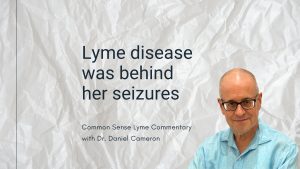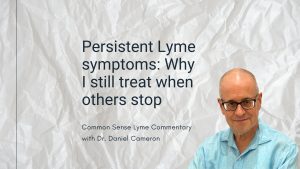Call for your appointment today 914-666-4665 | Mt. Kisco, New York

In the journal Cureus , Tahir and colleagues describe the symptoms and treatment of POTS,¹ a condition often seen in Lyme disease, which causes the heart rate to rise by at least 30 beats per minute for adults and at least 40 points for children “when the person stands up from a recumbent position.”
The symptoms of POTS are extensive. “POTS is an autonomic disorder characterized by symptoms such as palpitations, dyspnea, chest discomfort, lightheadedness, nausea, blurred vision, chronic fatigue, sleeping abnormalities, migraines, hypermobile joints, abdominal pain, irritable bowel, and bladder symptoms as well affecting various systems,” writes Tahir.
Autonomic dysfunction has been described in other disorders “such as cerebrovascular disease, movement disorders, dementia, multiple sclerosis (MS) and peripheral neuropathies,”2 explains Xiong et al.
There are a range of pathophysiologic changes in POTS. “POTS has heterogeneous pathophysiology, including excessive sympathetic stimulation, defective peripheral autonomic function, hypovolemia, or autoimmune dysfunction,” writes Tahir.
Treatment of POTS
There are a number of non-pharmacologic and pharmacologic treatments for POTS, writes Tahir. These include: increasing hydration, increasing salt intake, and wearing support stockings.
Medications to treat the condition include: beta-blockers, alpha-agonists, mineralocorticoids, along with selective serotonin reuptake inhibitors (SSRIs) and selective serotonin-norepinephrine reuptake inhibitors (SSNRIs).
The drugs pyridostigmine, desmopressin, and erythropoietin may also be prescribed but only rarely.
Note: Adrenergic alpha-agonists selectively stimulate alpha-adrenergic receptors, i.e. Midodrine. Mineralocorticoids are a class of corticosteroids that influence salt and water balances, i.e. Fludrocortisone.
Tahir’s review suggests that the medication Ivabradine might be effective by reducing the heart rate. Ivabradine is an FDA-approved drug marketed in the U.S. under the name Corlanor to treat symptoms of heart failure. It is not an FDA-approved drug for POTS. Ivabradine can cost over $400 a month when purchasing through GoodRx. 3
Related Articles:
Could autonomic dysfunction lead to pain in Lyme disease?
Could POTS and Lyme disease patients suffer from impaired cognitive function when standing?
References:
- Tahir F, Bin Arif T, Majid Z, Ahmed J, Khalid M. Ivabradine in Postural Orthostatic Tachycardia Syndrome: A Review of the Literature. Cureus. 2020;12(4):e7868.
- Xiong L, Leung TWH. Autonomic dysfunction in neurological disorders. Aging (Albany NY). 2019;11(7):1903-1904.
- Ivabradine, Corlanor. https://www.goodrx.com/ivabradine last accessed 7/4/20.




Do we see resolution of POTS with treatment of Lyme disease or is this damage done?
I often see marked improvements in my practice if the cause is a tick borne illness.
I often see marked improvements in my practice if the cause is a tick borne illness.
Yes. I have a patient with POTS who also has lyles disease which I am treating manually (MLD) to the cervical and occipital lymph vessels which accelerates cerebral spinal fluid exit into nasal mucosa and spinal meninges
Dear Dr. Cameron,
The first diagnosis I received in regards to my maladies was Hashimoto’s Thyroiditis, 1986. Followed by Endometriosis, 2003, CFS 2006, Adnomyosis 2006 (full hysterectomy 06/2006) never recovered. 2012 hospitalized for 10 days, 2.3 Hemoglobin. Received 50 Blood Transfusions, still no diagnosis. 17 Root Canals, all failed. Tonsillectomy 2013. Finally 08/2013 tested for Bb, Western Blot ~ Positive for Lyme Disease. 2013 w/Dr. R. Stricker testing & treatment for Bb pos, Babesia pos, Ehrlichia pos. via IGeneX. Presently still displaying symptoms. Testing w/Internist via Quest Diagnostics. New results as follows: LYME AB SCREEN
View trends Index value >0.90. My Question: Do I or should I request additional testing?? Per Website: If Lyme Disease Antibody Screen is ≥0.90, then Lyme Disease Antibodies (IgG, IgM), Immunoblot will be performed at an additional charge (CPT code(s): 86617 x2). I do not believe an Immunoblot was ordered or performed. Your thoughts? Which direction should I proceed? Should tests be performed through IGeneX? My state is governed by IDSA Rules and Regulations. Thank you, Dr. Cameron, you are a blessing and a hero to so many.
Do we see resolution of POTS with treatment of Lyme disease or is this damage done?
My 12 year old has all of these symptoms but was treated for Lyme disease 3 years ago. Could it be this? Her symptoms are palpitations, dyspnea, chest discomfort, lightheadedness, nausea, blurred vision, chronic fatigue, sleeping abnormalities, migraines, hypermobile joints, abdominal pain. And she’s also getting muscle twitches. Her doctors brush off the Lyme because she was treated but all of her testing is coming back good.
I have patients in my practice who have benefited from retreatment for a tick borne illness. I have had these patients be sure there is not another illness.
I have patients in my practice who are doing well after re-treatment for a tick borne infection despite being previously treated. They often have a number of what initially was thought to be unrelated conditions. Of course, they need to be evaluated for other illnesses.
I have hereditary alpha tryptasemia, and my son was just diagnosed with lyme/ co infection of ebv with a wonderful functional med dr you work with ( Dr G Brown. )I have noted cyanosis on my sons legs , along with the brain fog and fatigue , bp at 90/50 .Would like to take him for valsalva /qsart/ tilt but the local hospital here won’t even recognize the lyme . Do you do autonomic testing or know a Lyme friendly autonomic specialist. I’m not sure where the appropriate place to go for lyme related dysautonomia eval would be . Happy to come to NY. …
I have young patients with tick borne illnesses whose autonomic illness can be quite ill with autonomic issues. Some of them get better with treatment with antibiotics. I have had to treat some of them for autonomic issues at the same time. I do not do a tilt table in my office.
I was recently diagnosed with POTS after being hospitalized being tachicardic (heart rates of 150-160 dropping to 60s/70s in seconds). I have a family cardiac history of my father passing from a heart attack at 53 and mother had a heart attack and triple bipass. I have previous diagnosis of Lyme, babesia, parasites, ebv, bartonella, low hormone levels, heavy metal toxicity and mold. Also previous kidney infection and current bilateral stones. I started a beta blocker metoprolol and had horrible side effects though it worked for improving my heart rate I recently had to stop taking. Do you have any suggestions for medication that has worked well for Lyme patients with pots?
I have Lyme disease patients who have POTS. I do not have any new medications. I have patients whose response to medications for POTS improved when their Lyme disease was treated.
I have chronic Lyme, dysautonomia, lupus, gastroparesis and biliary dyskinesia…I have been living with this a very long time…I have had five bullseye rashes in twenty years time and recently bitten again last summer and symptoms got extremely worse..I’m trying to take supplements because I can’t afford a LLMD right now
What came first? Did Lyme disease cause your dysautonomia?
My son has POTS. EDS. MCAS I have people argue with me that it’s not that it’s JUST LYMES. I beg to differ. Your thoughts??
I have patients who fit more than one diagnostic criteria. They typically see more than one specialists during their evaluation and treatment.